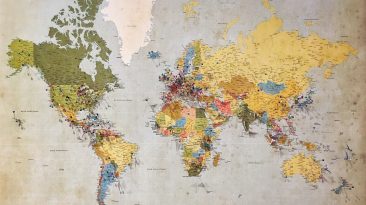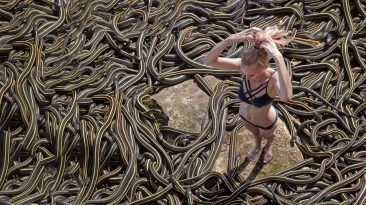In the Pacific Ocean, north of the equator, there’s a growing, “floating island” of trash that’s twice the size of Texas, and three times the size of France. It’s just another example of how we’re treating our planet like a dumpster.
Experts say that every year, we throw away enough plastic to circle the Earth four times. At that rate, by the year 2025, there will be more trash in our oceans than there are fish.
So how can we stop being so wasteful? Could we limit everyone’s trash to just one jar per year? Should we stop using smartphones? Or could we just feed all of our waste to worms?
Let’s start by looking at the idea of limiting everyone to one jar of waste per year — a mason jar, to be precise.
It might sound impossible, but there’s a whole community of people around the world who do this.
They practice zero-waste alternatives like making their meals from scratch, recycling or reusing all materials, and only buying sustainably-produced clothing. Although this is probably unrealistic for some people in the world, because of the time and money involved, the ideas behind it could help us become a waste-free planet.
How would a world without waste affect our environment, our economy, and even our housing markets? The main idea behind creating no waste is a concept that was coined in the 1990s called “cradle to cradle.”
It’s a simple concept at the core: biological products like food, and items made from natural goods like trees, are utilized until they cannot be used in their current form. Then they’re broken down in a natural way, like composting, to help make new materials.
For instance, “cradle to cradle” doesn’t mean we can’t keep using smartphones. It just means that we have to recycle them when they break, so their components can be repurposed for new goods.
If we all embraced this idea in our everyday lives, we’d see a reduction of waste on our planet. But we’d never get anywhere near our zero-waste goal if corporations didn’t embrace it as well.
Some companies are already taking the initiative. They’re finding creative ways to make more sustainable products, by recycling and reusing items, or by devising ways to clean the Earth as they make new products. For example, Adidas has started to make shoes, and other goods, from plastics collected from the ocean and recycled.
But our best hope for cleaning up our act might be Mother Nature herself. Her powers were on full display when the Spanish National Research Council discovered that wax worms could eat and digest plastic! Researchers are still figuring out how this works, but it could be a breakthrough in helping to get rid of the plastic in the oceans.
Who knows how many other groundbreaking alternatives like this are out there, just waiting to be discovered? If more organizations invest in research like this, we could soon find out. And each alternative we discover could bring us one step closer to a waste-free society. Can you picture it?
If we were able to move into waste-free future, the economy would have to change, as people wouldn’t demand or accept plastic or single-use consumer goods like we currently do. There would be a decreased demand for landfill space, as less trash would be created, meaning there would be less waste to dispose of.
Ideally, long-term, we’d have cleaner water, cleaner air, more trees, and we’d mine fewer metals for use in high-tech items like smartphones. We’d also have richer gardens thanks to more compost, as more people would be contributing their household food waste to community or personal compost bins.
Buying less stuff might even make people happier, and able to live in smaller houses, which could, on a grander scale, help to accommodate the population boom we’re expecting across the globe in the next few decades.
As great as this all sounds, it would be very difficult to achieve. We would need all the world’s nations working together with one unified vision.
Subscribe to What-If on YouTube or follow the show on Facebook Watch.
Sources
- “GEORGE WASHINGTON CARVER AND HENRY FORD: PIONEERS OF ZERO WASTE” 2019. zerowaste.org. Accessed December 5 2019.
- “How People Make Only A Jar Of Trash A Year”. STEPHEN LEAHY, 2018. nationalgeographic.com. Accessed December 5 2019.
- “22 Facts About Plastic Pollution (And 10 Things We Can Do About It)”. 2019. Ecowatch. Accessed December 5 2019.
- “Zero waste: The forgotten climate change mitigation tactic”. Emily DeCremer. 2019. gbci.org. Accessed December 5 2019.
- “The Circular Economy Made Real”. Doermann, Lindsey. 2019. anthropocenemagazine.org. Accessed December 5 2019.
- “Cradle to Cradle: 4 success stories, from countertops to fabrics”. Florence Lumsden, 2014. Greenbiz. Accessed December 5 2019.
- “The Little Wax Worm Might Solve Our Great Big Plastic Problem”. 2019. INSH. Accessed December 5 2019.
- “ZERO WASTE VERSUS RECYCLING: WHAT’S THE DIFFERENCE?”. 2017. Sustainable Jungle. Accessed December 5 2019.



























